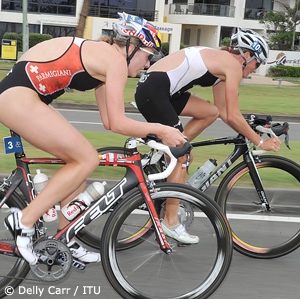NZ Powerhouse Nicky Samuels
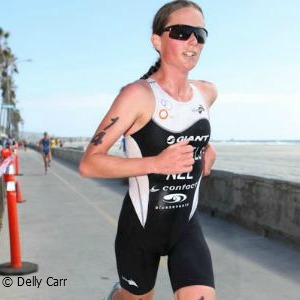
Nicky Samuels is known at a defiantly strong cyclist and in 2012 she won two World Cups in daring breakaways. However it is not all roses for her. Nicky has dealt with numerous health related setbacks but still qualified for the 2012 Olympics chasing points for her country’s third spot. Nicky opens up about a trying 2012 season and her plans in the future.
Slowtwitch: How did you get into the sport?
Nicky Samuels: I studied at Otago University for five years and during this time I was working at the Whangarei Aquatic Centre as a holiday job. Sam Warriner was swimming there and wanted some company, so finally I agreed I would get in the water with her a couple of times a week. This led to doing other things for fitness with her. I was a field hockey player at National League level so any fitness was helpful. Sam encouraged me to race the Age-Group National Champs in Queenstown 4 weeks later. At age 20, I finished 3rd in the 20-24 age group and automatically qualified to race in the World Championships which were later that year and on the same course in NZ. I was encouraged by my mother who gave me some money towards the entry fee and I competed with a goal not to come last. I came second so figured, without much training, that maybe I was “naturally” good at this sport and slowly put my hockey stick to rest half way through 2004. In 2005 I continued to study and didn’t race many races because I couldn’t afford the travel expenses. In 2006 I was applying for jobs as a teacher and it was suggested I contact a French club. They were eager to have me, all expenses paid for 6months. For a poor student this was perfect, and off I went. There was no looking back.
ST: This season you had two World Cup wins and both came after you pushed the swim and more-or-less soloed the bike. Is that your usual plan?
Nicky: The girls are getting so fast running that for me sometimes it seems like that’s the only way to get a win. However, 99 times out of 100 it won’t work, but you have to take these opportunities if they arise, rather than finish wondering.
ST: Is it scary to lead a race the whole way?
Nicky: Leading from the front is great, after all you are in control and it’s up to others to change that.
ST: Are many of the ITU bike courses to your liking?
Nicky: They’re getting fewer and fewer as the big races go to big cities. Big cities have the money to hold these events and unfortunately, are often on flat spaces so the races become flat and fast. I like a hard hilly bike course because it takes the sting out of everyone’s legs and thus slows the run down. The Kitzbuhel WTS race next year is planning to head up a mountain so that sounds right up my alley.
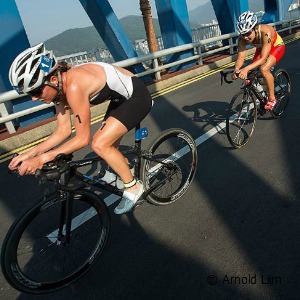
ST: What changes would you suggest to the ITU?
Nicky: Make them more challenging and true to each discipline. Swim in the surf, have a challenging bike course- undulating, technical or up a mountain, and run with some off road sections!
ST: How do you change your tactics if you know a breakaway is not possible?
Nicky: I try and save my legs as much as I can on the bike, I know my cycle leg is relatively strong so the cycle should be taking more out of the other athletes than myself. I’m a bit of a tractor when it comes to the run so it takes me a while to warm up, so the fresher my legs the quicker I get into it.
ST: What comments have your coaches and training partners made about your running form?
Nicky: I need to get more out of my stride length. I have long legs so need to use them to my advantage. Also I have a “gammy wrist” and if I keep that strong I run a lot better, but it gets going when I am tired.
ST: How has your run training been going?
Nicky: When it’s going well its going well, when it’s not, it’s not! I seem to run better off a hard bike, or if I have been training really hard, for some unknown reason I race a lot better. That’s also why I enjoy racing non drafting races in America-they are really good training events for me. I have struggled with run training for the past 3 years. I was running well in 2008 until I had a stress fracture through my pelvis. I was given the orders of no walking, no standing, no exercise at all for 8 weeks. I got back into it and had no further problems but really struggled to get my running form back and of course was weary of getting another stress fracture. In 2007 and 2008 my coach and I were playing with the idea that I had asthma, but it turned out it was a heart problem. Instead I was diagnosed with Right Outflow Track Tachycardia. Having this has plagued my training at top level, mainly for running as that is where I get my heart rate the highest. If I pushed over 80% effort I was about 50% likely to get issues and have to stop or slow down and if I didn’t I would fall down. If I pushed over 90% probably 9 times out of 10 I would get a problem. So I have been racing and training with these limiters for my running but this year has been the first year that I have had it fixed and not had those problems. This was until the WTS Finale in Auckland but that’s another story… I guess it’s hard for a coach to get you to top level while working within these barriers.
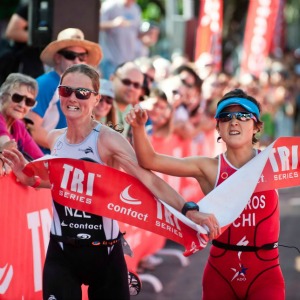
ST: What is Right Outflow Track Tachycardia?
Nicky: It is the area in my heart that electrical impulses are circulating instead of beating as per normal. It therefore causes my heart rate to go very high for periods of time and “flutters” so I am not getting the oxygenated blood that I need when I need it most. It usually occurs during running as that is when I am working the hardest. As a result I need to slow down or stop to either let it pass and get back to normal or it will make me stop all together.
ST: What are some of your favorite American races?
Nicky: I have raced a couple of Toyota Cup races, one in Dallas and the other was in Philadelphia, which I won (it was changed to a Duathlon that year). I have raced and won the Escape from Alcatraz, which is my favorite triathlon to date. Then I raced the IMG Beijing International Triathlon, not in America but run buy an American Company, and that was a fabulous experience where I placed second.
ST: Like you I also ride a Giant. What bike are you on?
Nicky: I am on the Giant TCR advanced. It’s a great bike. When I changed to a Giant the first thing I noticed was how much more responsive it was. Every pedal stroke gives immediate power, I love my Giant.
ST: How did the Olympics go for you?
Nicky: Terrible. I am capable of coming out of the water in the top 10 but I just got nailed at the first buoy and didn’t recover. I need to do a lot of wetsuit swimming and I didn’t have the opportunity to do this before the Olympics because of where triNZ was based. We had a team agreement that if Kate McIlroy or I were in the second pack we wouldn’t work because Andrea Hewitt was considered our only chance of a medal. I appreciated this contract, and agreed so I had to twiddle my toes back while the race was over 2 minutes up the road. That’s how big races work, sometimes everything goes to plan, others go the wrong way. I am a big believer that ITU racing is not only for fast swimmers and fast runners but it also holds some degree of luck too.
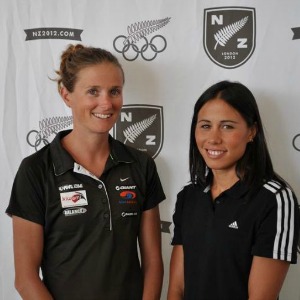
ST: How does the weight of the Olympics compare to the importance of performing well in the WTS series?
Nicky: For me it was just like another race. I prepared just as I would for a WTS race. The hardest part for me was getting selected. And when you do all this in one year it ends up something like this: I had my second round of heart surgery at the end of January (to try and fix an arrhythmia) and then built to April where I had to peak for the selection race, the Sydney WTS. This is of course the most important because if you don’t get selected you can’t plan any further, so all my plans stopped here. I then had my appendix out, which was another setback but 2 and a half weeks later I had to line up in San Diego. I wasn’t well but needed points. I still regret racing. I had to race again 2 weeks later in Madrid and had to beat certain people, finish as high up as possible, it was tough but I got that third spot for our country. Then I had to peak again for London. And then try again for Auckland….
ST: You also had your appendix out?
Nicky: Yes, it seems that bad things all happen at once. I think your appendix is a ticking time bomb that is just waiting to go off. I first had problems in February while I was altitude training. I was given medication for a “sore stomach” which of course didn’t help. I went back 2 weeks later after the pain wasn’t going away and went on antibiotics for a week. I raced our Oceania Champs in Australia that weekend. Then it was sore on and off over the next month but not as bad as the first bout. In April it was our selection race in Sydney for the Olympics. I made the team and went up to Auckland for the team announcement the following Wednesday. That night I went out for Indian food with my father and instantly I knew I was in trouble again. I drove home, had a doctor’s appointment, drove an hour to the nearest place to have a scan. I was then told to drive quickly back home and in 4 hours time I was in the emergency room. The hardest thing for them to realize was that athletes have a high pain tolerance. So although I had an appendix which was about to burst they had a hard time believing me because I didn’t “look in pain.” They were very surprised at what they found when they opened me up. I was lucky to be given special treatment because they knew I had the Olympics this year and a race to do very soon. The surgeon called in his boss and he managed to get it out laproscopically. I was very lucky and stayed in hospital for 3 days and managed to get out without any infections. 10 days later I was on a plane to America to race the San Diego WTS, as I needed to keep my points up. I was there only in person, I didn’t go so well! But I scrapped up a few points to help our country keep that third spot. Rather interestingly, while I was away I got a letter from the hospital asking how soon I planned to get back work or physical activity. The options given were 4-6weeks, 6-8weeks or 8-10weeks, so we beat that one!
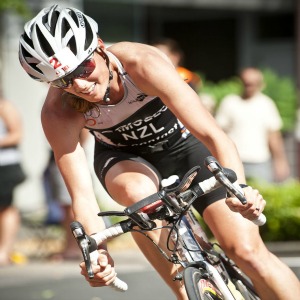
ST: What did it mean to you to have the Grand Finale in your home country?
Nicky: It was amazing to have it in NZ, the atmosphere was great. It also means you get a course which suits your athletes. Having a challenging bike course was perfect. I raced the World Aquathlon championships on the prior Wednesday and came home with that title. The number of people that were out cheering me on was great and a good chance for me to have a bit of a hit out before the big race. That “big race” was great, I swam well, the bike was fun, non eventful but fun. Then I started slowly as I usually do on the run. As I built into it I had several problems. My heart arrhythmia was back in full force and I struggled to finish the race. I am so disappointed but still hoping it is a one off thing…so the cycle begins again.
ST: How nice does the title of World Aquathlon Champion sounds?
Nicky: Any world title sounds good. I’ve always wanted to race it so I’m glad I have done it now.
ST: What are your goals for next year?
Nicky: I’m unsure at this stage, I’m on a break away from everything triathlon. Most likely I will keep going on the world circuit and really give my running a crack this year to see if I can get it up to scratch. I would like to spend some time in America and do some Olympic Distance non drafting races as they are great hard training hit outs and always good fun.
More about Nicky at
http://www.nickysamuels.com/


